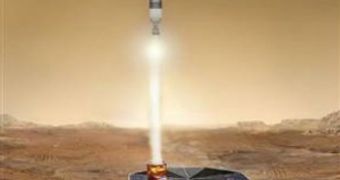There is currently an important controversy at NASA, concerning a mission that would return samples from Mars. While many NASA planetary scientists agree, in view of the huge scientific importance of the mission, some disagree, fearing that it will dry up money for other missions.
The Mars Sample Return Mission would be a spaceflight mission to collect rock and dust samples from Mars and to return them to Earth for analysis. One particular proposal, a joint project between NASA and ESA, has been suggested for launch either during the mid 2010s or the early 2020s.
One of the most active supporters of the mission is Alan Stern, NASA's new associate administrator for the Science Mission Directorate, who estimates that the ambitious mission could cost from $3 billion to $4 billion.
However, not all scientists agree, considering that it "would suck up all the available money for most other Mars missions in the next decade and disrupt NASA's ability to send at least one robotic mission to Mars every two years," according to Space.com. A huge debate over the subject involved around 500 leading experts on the planet and its exploration, who met at the Seventh International Conference on Mars, held July 9-13 at the California Institute of Technology.
The debate began when Stern proposed the cancellation of one Mars mission opportunity sometime during the next decade, to redirect money to the sample return mission. Another proposition was to equip the next NASA rover to go to Mars, the Mars Science Laboratory, so that it would be able to perform the first task of caching rock samples, instead of crushing them on the spot for immediate analysis.
Philip Christensen, a leading Mars scientist and professor in the Department of Geological Science at Arizona State University in Tempe, has a different opinion, if not opposed, at least reserved: "I'm cautiously optimistic," he said.
"I am concerned that the sample return mission would take over the Mars program. If you put that mission too far into the future, with not much in between, then you lose a lot of momentum ... a lot of young talented scientists and engineers."

 14 DAY TRIAL //
14 DAY TRIAL //